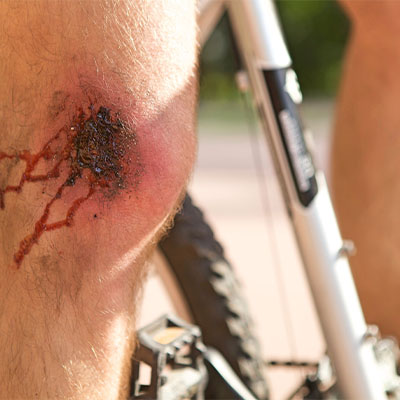Wounds
Wounds
(abrasions, lacerations, punctures, or avulsions)
An open wound involves an external or internal break in your body tissue, typically involving the skin. Falls, accidents with a sharp object, and car accidents are the most common causes of open wounds. In the case of a severe wound, you should seek immediate medical care, especially if there is a lot of bleeding or if you cannot stop minor bleeding within 20 mins.
There are basically four types of open wounds:
- Abrasion occurs when your skin scrapes against a rough or hard surface.
- A laceration is a deep cut or tearing of your skin by items such as knives, tools, or machinery. If deep, bleeding can be rapid and heavy.
- A puncture is a small hole caused by a pointy object like a nail, needle, or bullet (bullet puncture). When deep, punctures can damage internal organs.
- Avulsion occurs when there is a partial or complete tearing away of the skin and the tissue beneath. Avulsions typically occur during violent accidents.

Although you can treat some abrasions and minor laceration wounds at home, you should see a health care provider if:
- Your wound is deeper than 1/2 inch
- Bleeding does not stop with direct pressure
- Bleeding lasts longer than 20 minutes
- Bleeding is the result of a severe accident
Note that puncture wounds may not bleed very much, but they can cause serious damage if deep enough. If you have even a small puncture wound, visit your doctor to see if you need a tetanus shot to prevent infection.
Treatments for minor wounds may include:
- Cleaning and possibly numbing the wound area before stitching
- Closing the wound using skin glue, sutures, or stitches, or possibly deciding not to close it depending on its location and potential for infection
- A recommendation to get a tetanus shot if needed for a puncture wound
- Advice on pain medication such as Tylenol, penicillin, or another antibiotic if there is an infection or high risk of developing one
- A referral to a surgeon when needed
Caring for Skin Abrasions and Minor Lacerations at Home
Minor wounds and abrasions can often be treated (at least initially) at home. Skin scrapes and abrasions, often called raspberries, are usually bright red and painful and are sometimes difficult to treat. These are wounds to the top layer of skin, and while they often heal quickly, sometimes large and deep abrasions can get infected or cause scarring. The most significant health threat with minor wounds is an infection, so it is essential to clean and treat the injury properly.
Minor lacerations are cuts to the skin that often cause a burst of bleeding. Applying pressure can often control bleeding quickly. If not, see a healthcare provider promptly.
Steps for initially treating a skin abrasion or minor laceration:
- Use direct pressure and elevation to control bleeding and swelling.
- Apply ice if there is swelling or bruising.
- Clean and wash your hands before caring for the wound to reduce the likelihood of a bacteria infection.
- Rinse and clean the abrasion or laceration by gently pouring lukewarm water over the affected area for a couple of minutes. Do not aggressively scrub the wound. Gently remove any dirt or other particles from the wound if you can.
- Apply a thin layer of petroleum jelly or antibiotic ointment to keep the affected area moist and prevent infection. However, if you notice a rash or redness due to the antibiotic ointment, stop use.
- Protect and cover the wound by using a clean bandage or piece of gauze with tape. This step helps keep the wound clean, can prevent it from reopening, and keeps the area moist to help with healing.
- Take acetaminophen if needed and as directed. Avoid aspirin since it can cause or prolong bleeding.
- Change the dressing with new bandages at least once a day or when the affected area gets wet or dirty. Try to remove the gauze in the direction of hair growth, but stop if you feel resistance due to a scab stuck to your bandage. If you do feel resistance, make a saltwater solution using one teaspoon of table salt/gallon and soak your bandage-covered wound in the solution for a few minutes. Try to remove the bandage again; this may take several attempts.
- Do not pick scabs as they are your body’s natural way of protecting the wound from germs and are a good sign you are growing new skin beneath your wound.
- Check for signs of infection, including:
-
- The wound is still not appearing to heal or has even gotten worse after a few days of care
- Increasing amounts of pain
- The abrasion or the area around the wound continues to be red, swollen, or warm,
- Fever
- Pus, drainage, or other discharge coming from the abrasion
If you think your wound is infected, contact your provider for an evaluation. You may need an oral antibiotic or a strong topical antibiotic in addition to taking other steps. Infections should not be ignored as they can spread to other parts of your body.
Your primary care provider at Catawba Valley Healthcare can be reached at (828) 695-5900.
